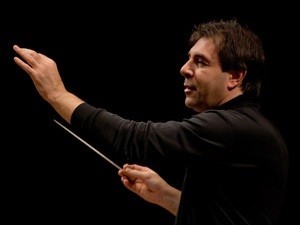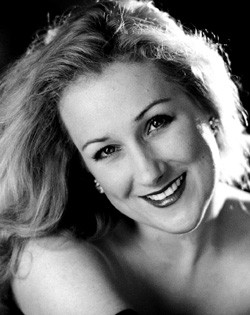|
Back
A Requiem for the Living New York
Isaac Stern Auditorium, Carnegie Hall
03/01/2015 -
Johannes Brahms: Ein deutsches Requiem, Op. 45
Diana Damrau (Soprano), Christian Gerhaher (Baritone)
Westminster Symphonic Choir, Joe Miller (Conductor), Vienna Philharmonic Orchestra, Daniele Gatti (Conductor)

D. Gatti (© DanieleGatti.com)
New York hasn’t been so much bombarded as Brahmsbarded by the Vienna Philharmonic this week. All four symphonies played over two evenings, by an orchestra almost umbilically attached to the composer. Yesterday afternoon, they finished the tour with only a single work by Brahms, but by far his longest. And for New York secularists, one of the most appealing.
Granted, most celebrated Masses are written by 19th Century agnostics (or, like our Founding Fathers, ”free-thinkers”), but from Beethoven’s Missa Solemnis to Requiems of Verdi and Dvorák and Fauré, the Latin supplications give a veneer of true religiosity.
On the good side, this means lots of hellish trombones and trumpets, a vengeful God which needs Verdi’s circus-drum, choruses give a zing and a blast to the perils of death.
On the less good side, Brahms’ sincerity, his Luther-translated Biblical score never mentions Jesus, only incidentally mentions “Herr”, the Lord, and dwells on us mourners rather than the future of the corpse. This means less excitement, less Catholic “Day of Fire and Wrath”, more Protestant quiet sobs. In fact, Brahms preferred the title “A Protestant Requiem” to the linguistically authentic German Requiem.
So if the excitement is the cerebral kind (and the work was criticized at its premiere for being too intellectual), one must take most pleasure from the performers. No conductor can fake the Brahms Requiem with vocal vibrations and brass bands in the balconies. Like the Seinfeld mantra, “Serenity now”, one needs an augmented serenity from the forces.
But when I say “needing”, and the orchestra is the Vienna Philharmonic, such instructions are superfluous. The sounds of this orchestra have that double-virtue of being unique and evocative at once. I cannot think of any orchestra in the world which has the shadings, the subtlety, those dark velvety tones which can soar into the brighter shades of the scale so smoothly. So interesting are these colors that the first movement of the Brahms sounded as if the whole orchestra was playing–though as we know Brahms kept his violins out of the mix.
When they joined, conductor Daniele Gatti, always a pleasure to watch and hear, gave a performance that was strong, even fortifying. I have heard this work which so reverent that it was dull (not even the worst conductors can do that with the Verdi and Berlioz!), but Mr. Gatti changed each movement, so the sounds and the message were different.
Mr. Gatti may have started the second section with that plodding footstep–after all, this is an ancient Lutheran hymn itself–but it gathered its orchestral storm well ending with true gravity. And when he reached the only quasi Dies Irae section, where “the trumpet shall sound and the dead shall be raised”, he let his forces go all the way with a great timpani crescendo.
This is indeed a Requiem for the chorus, and the 125-odd voices of the Westminster Symphonic Choir under Joe Miller, let themselves go full force. The Isaac Stern Auditorium does not have the sepulchral resonance of a great church (like the Bremen Cathedral, where Brahms conducted it), but these voices were clear, the German usually well understood without the program, and the sounds gave a lift to the otherwise somewhat leaden text which Brahms himself had chosen.

D. Damrau (© Virgin/EMI Classics)
The two soloists could not have been more different, but this was totally in line with Brahms’ aims. Christian Gerhaher could have been called here a heldenbaritone, so forceful and dramatic were his lines, spitting out the words the resurrection.
As for Diana Damrau, I assume that the full house for a snowy Sunday afternoon came partly just to hear her. She is a familiar voice in the Metropolitan Opera, and in her short solos here, her voice was more a prayer. Sweet without cloying, praying without sanctimony.
George Bernard Shaw, a fervent Brahm-phobe, once said that “the Brahms Requiem could be borne patiently only by the corpse” but he must have heard a conductor who made the music tenuously whisper. That never happened here. We New York agnostics and atheists didn’t need the comfort of a Heavenly Father. We were in equally safe hands with such an orchestra, such soloists and such an ethereal choir.
Harry Rolnick
|